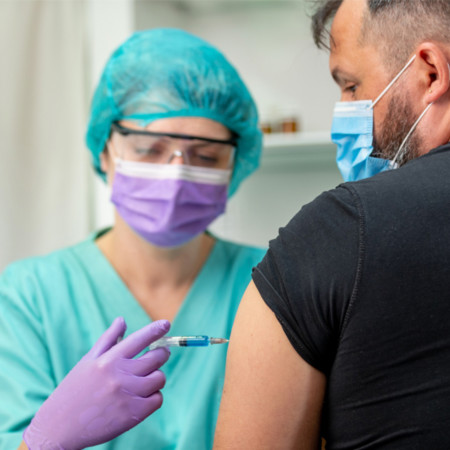When Suburban Hospital received the go-ahead from Maryland and Montgomery County officials that it could serve as a vaccine clinic site for the community, the team sprang into action. In less than 48 hours, the hospital had set up a full clinic to vaccinate as many as 400 people per day, with room for physical distancing and all safety protocols.
“We call the community vaccine clinic the happiest place in the hospital because people are so overjoyed to receive the vaccine,” says Cindy Notobartolo, Suburban Hospital’s administrative director of emergency department/trauma, safety and security services. “Receiving notification to book an appointment is one of the best gifts anyone can receive.”
The Johns Hopkins Health System began providing vaccinations for its employees in mid-December, per state and local guidance. On Jan. 23, Maryland state officials said Montgomery County would receive 9,000 doses within a week to be administered by Johns Hopkins Medicine, including Suburban Hospital. The provision was dependent upon them going to eligible Montgomery County residents.
“The state was asking us to deliver a large number of doses very quickly, and not all to our own patients,” says Leslie Ford Weber, director of government and community affairs for Johns Hopkins in Montgomery County.
Appointments for residents began Jan. 28. After the clinic successfully administered the initial 9,000 doses, it continued operation, distributing allotments provided by the state.
“The vaccine supply is in constant flux,” says Notobartolo. “We don’t know from one week to another how many we will receive. But we have clear processes and protocols in place, and are ready to go when we are notified of new allotments.”
Eligible community members receive a notification from MyChart, the centralized patient portal for the Johns Hopkins Health System. The health system’s technology experts teamed with Montgomery County Public Schools and private school organizations to create MyChart accounts for educators who are eligible under phase 1B of Maryland’s vaccine plan.
With these two categories of MyChart accounts, the hospital uses a random selection tool to invite eligible residents to schedule vaccine appointments, says Weber. Suburban also opened a call center to help people access and use their MyChart accounts to ensure they are set up to receive messages and updates about the vaccine.
About 25 employees volunteer their time for each clinic session, says Notobartolo. “We need people in the parking garage, people to register participants as they come in, people to vaccinate,” she says. “All of them have other jobs, but we are fortunate to have so many dedicated staff members who want to play a role and be part of ending this pandemic.”
One such employee, trauma department director Melissa Meyers, described working in the clinic as a “healing experience.”
Toby Levin, of the hospital’s Patient and Family Advisory Council, says she has heard from friends who praised the cheerful and efficient care they received. “Each one commented on the well-organized process and the warm welcome and assistance throughout their experience,” she says.
The entire vaccination process generally takes about 45 minutes, and residents never have to wait outdoors. After receiving the shot, they remain for 15 minutes for observation and to schedule a second dose.
“Our COVID-19 vaccine clinic has been giving thousands of residents a chance to visit their parents, children and grandchildren sooner than anyone imagined,” says Kelly Heller, a Suburban Hospital nurse and patient experience liaison for the emergency department. She notes that even people who have received both vaccine doses should continue wearing masks and maintaining physical distance.
“This terrible virus has taken so many of our friends and family and isolated us all. We now have a glimmer of hope.”


